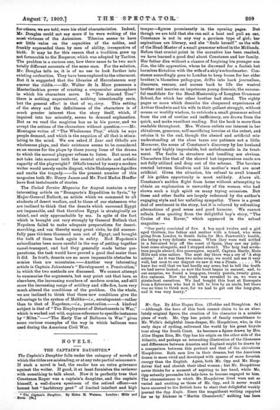NOVELS.
THE CAPTAIN'S DAUGHTER.*
The Captain's Daughter falls under the category of novels of which the titles are misleading, or at any rate partial misnomers. If such a novel is bad, the reader has an extra grievance against the writer. If good, it at least furnishes the reviewer with something to talk about. Now it is perfectly true that
• Constance Roper was a captain's daughter, and the captain • himself, a well-drawn specimen of the retired officer—an honest but " harbitrary gent" of limited intellect and high
• The' Cciptaitei Daughter, By Helen H. Watson. London: Mills' and Wan. [8t6]
temper—figures prominently in• the opening pages. But though we are told that she can sail a boat and pull an oar, Constance is. not in any way a. garrison type of girl; her aspirations are literary, and she ".finds herself" as the wife of the Head-Master of a mall grammar school in the Midlands. Before that crucial point in the narrative has been reached, we have learned a good deal about Constance and her family.
Her father dies without a chance of forgiving his younger son Jim, the idle apprentice, whom he disowned for a foolish but harmless flirtation with the wife of a ship's schoolmaster. Con- stance accordingly goes to London to keep house for her elder brother,•a blameless pedagogue, drifts into hack journalism, discovers, rescues, and nurses back to life the wastrel brother and marries an impetuous young domiuie, the success- ful candidate for the Head-Mastership of Longton Grammar School, for which her other brother had stood. The eighty pages or more which describe the chequered experiences of Arthur• Goodwin and his wife in their gallant struggle, without means or worldly wisdom, to extricate a small grammar school from the rut of routine and inefficiency, are drawn from the quick, and make excellent reading. But the book is more than
readable throughout. Mrs. -Watson enlists our interest in her chivalrous, generous, self-sacrificing heroine at the outset, and retains it to the end, though the absurd and artificial mis- understanding at the close taxes our patience not a little. Moreover, the scene of Constance's discovery by her husband is not only highly improbable, but melodramatic in its treat- ment. The faults in structure and handling are obvious. Characters like that of the shrewd but impecunious uncle are not fully utilised and drop out of the scheme. The barriers
erected between Goodwin and his mother's ward are most artificial. Given the situation, his refusal to avail himself of his golden opportunity is most unlikely. Above all, Constance's sudden flight from home without attempting to obtain an explanation is unworthy of the woman who had shown such a high spirit on many trying occasions. But these and other faults are largely redeemed by the author's engaging style and her unfailing sympathy. There is a great deal of sentiment in the story, but it is relieved by refreshing alternations of good sense and good humour. We cannot refrain from quoting from the delightful boy's story, " The Cruise of the Rover," which appeared in the school magazine :-
"Our party consisted of five. A boy aged twelve and a girl aged thirteen, the father and mother with a friend, who were going from London to South India for Mrs. Ponworth'e health, she being a very delicate woman. When they were well settled in a fair-sized brig off the coast of Spain, they saw my jolly- boat come alongside, and I stepped aboard. The brig had sevdn- teen people aboard, five passengers, myself, Captain Hardy, Mate Hills and nine sailors. The next day there was a cry of 'A ship astern.' As it was then two miles away, we could not see it very well, but soon to our disgust we saw it was a Pirate. . . . . . We knew too well that we had hardly any arms, but to tell the truth we had never looked ; so now the hunt began in earnest, and, to our surprise, we found a long-gun, twenty pistols, twenty guns, five cannons. Now the truth was revealed to us, we were a pirate-boat ourselves. We had bought this boat at Ramsgate from a fisherman who had it left to him by an uncle, but there was no time to think now, for we had to get out the long-gun, and it was very heavy."






































 Previous page
Previous page